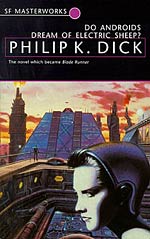
![]() ParallelWorlds
ParallelWorlds
4/30/2014
![]()
Doubleday, 1968
Intended Audience: Adult
Sexual content: Significant
Ace/Genderqueer characters: ? (A.I.)
Rating: PG-13 for violence and sexuality
Writing style: 4/5
Likable characters: 4/5
Plot/Concepts: 4/5
Rick Deckard is a professional bounty hunter, living on a mostly-abandoned post-apocalyptic earth. The bonuses he gets for "retiring" fugitive androids could one day buy him a real animal to care for, but in the meantime he has to make do with an electric sheep and hope that the radioactive dust doesn't turn him sterile and erode his intelligence.
I love it when a book surprises me by being much more human and emotionally engaging than I expect. Considering that I couldn't sit through Blade Runner (which was inspired by this book), I was a little wary when picking this up. But the first scene—involving something as simple as Rick and his wife waking up and choosing their mood for the day using a "mood organ"—caught my attention and after that I ended up reading the rest in one or two sittings.
The author does a great job laying out the differences of Rick Deckard's world in a way that feels matter-of-fact and natural. These differences affect the characters in very real and personal ways. For example, Rick doesn't seem at first glance like the kind of man who would put a lot of stock into religion or be particularly concerned about animals, but because of the environmentally devastated world he lives in, and the pervasiveness of Mercerism (a religion which focuses on empathically linked visions and giving care to animals as a path to redemption for all humanity), he is totally preoccupied with owning a real animal rather than his electric sheep. He also, throughout the course of the book, becomes very concerned about his own level of empathy and where that empathy is being directed.
I would say that empathy is the primary theme of this book: why it's important; the line that may or may not exist between self-interest and true empathy; whether having empathy for the un-empathic is wise; and what makes people feel empathy and extend it to those they may or may not deem as human. An important argument in favor of killing these fugitive androids (who have often committed violence in the course of their escape from the space colonies) is that they have no empathy, not even for each other. In fact, because androids have become so advanced, one of the only ways to tell an android from a human is to administer an empathy test—but naturally, this is dangerous because some real humans will fail this test as well. I found it wonderfully provocative that many of the questions in this empathy test had to do with compassion for animals. I think many humans of the present day would not pass this test; because of how much Rick's world is steeped in Mercerism, being comfortable with using a leather wallet or sleeping on a bear skin rug brings one's humanity into question. This poses a lot of great questions about culture's role in determining the parameters of humanity.
As always, I assume that artificial intelligences are asexual and genderless unless proven otherwise. There is robot sex in this book although it mostly takes place offscreen and did not bother me too much. It is never explained whether the robot in question feels sexual attraction or merely a programmed physical response… or if she was just faking it. A lot of this (and other aspects of the story) is left up to the audience to wonder and decide for themselves, as it is left up to Rick to wonder as well.
The characters, human and android alike (and there were about an equal number of each) were all well drawn and easy to feel for despite the spare and concise passages which introduce them. Although there were very few female characters, I did not feel that they were treated too disrespectfully, all things considered. All of the characters were distinct from each other, and each obviously had their own agenda and struggles which could be sensed off screen. This world feels much bigger than the glimpse we are allowed, and I always appreciate it when an author can give us that sense without making us feel lost or left out. The dialogue was engaging and used skillfully to illuminate the unnerving otherness of the androids as they talk amongst themselves about how to survive and whether this "empathy" concept being used to exclude them is even real. The plot played with my mind in a good way on multiple occasions. There were a lot of moments where I spun off into wild speculation about this character or that character, only to be proven wrong.
At the end of it, I felt simultaneously disturbed (thankfully not traumatized) and inspired. The climax and resolution are not preachy but leave much to be pondered as we experience Rick's emotional disorientation at all that has happened inside and outside of himself simply as a result of his trying to live a successful and meaningful life on a dying planet. And there was, simultaneously, another man's story: Isidore, a "chickenhead" who has become what Rick feared the radioactive dust would make him, and yet he still possesses qualities which the androids envy. Isidore's story was oddly touching, and added a whole other layer of emotional weight to the narrative.
I can see why this book is so famous. It is one that could be read several times and spur new thoughts and insights with each reading. There is so much packed into this little book, all in less than 300 pages. I do not hesitate in recommending it to anyone—the questions it asks are varied enough that there should be something for nearly everyone to think about.
http://parallelworldsmagazine.tumblr.com/post/84378427098/book-review-do-androids-dream-of-electric-